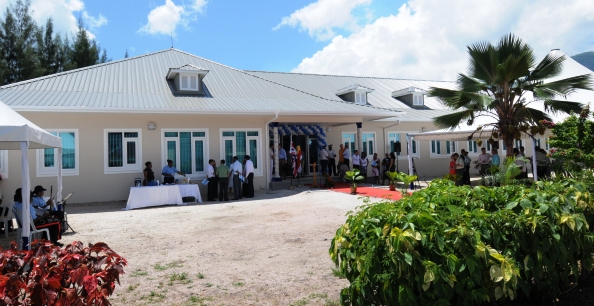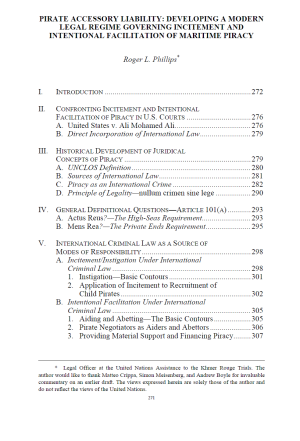
The Regional Anti-Piracy Prosecution and Intelligence Coordination Centre (RAPPICC) in Seychelles, the objective of which is to undermine the piracy business model by bringing pirate leaders, financiers and enablers to justice
As we have reported here, here, and here, the UN Security Council has long expressed its interest in the creation of specialized chambers to prosecute pirates in the East African region. On 18 November 2013, the UN Security Council again raised the prospect of creating such chambers (Resolution 2125), following the UN Secretary General’s report on piracy off the coast of Somalia of 21 October 2013 (UNSG Report), which Matteo analysed here. This comes on the heels of a donor conference at which substantial funds were pledged to assist Somalia. It also comes as the failure to prosecute pirate kingpins has become increasingly conspicuous.
Background
In October 2011, the UN Security Council decided in Resolution 2015: “to continue its consideration, as a matter of urgency, without prejudice to any further steps to ensure that pirates are held accountable, of the establishment of specialized anti-piracy courts in Somalia and other States in the region with substantial international participation and/or support,” and requested the UN Secretary General to report on the modalities for the creation of such specialized chambers. The UNSG provided his report in January 2012 indicating the costs and estimated capacity of creating specialized chambers in several regional states and regions of Somalia, including Kenya, Tanzania, Seychelles, Mauritius, Puntland and Somaliland. Since that time, prosecutions have indeed continued in each of these countries, with some (mainly Kenya and Seychelles) bearing the burden. However, no specialized chambers have been created to date.
Backlog of Cases
The UNSG Report notes that 53 suspects are currently on remand for trial as pirates in Mauritius, Kenya and Seychelles. This is despite the significant contribution of the international community into prosecution and incarceration of pirates in the regular court systems of states such as Kenya, Mauritius and Seychelles, the most prominent being UNODC’s counter-piracy programme valued at $60 million. Resolution 2125 laments that “the continuing limited capacity and domestic legislation to facilitate the custody and prosecution of suspected pirates after their capture has hindered more robust international action against the pirates.” This translates to a backlog of cases in the judiciaries relied upon by the international community to prosecute such cases. As compared with regular criminal courts in these countries which suffer from significant backlogs, it is hoped that specialized piracy chambers with particularized knowledge of piracy cases would permit more efficient prosecutions.
Reduction but threat of resurgence
Apart from the persistent backlog of cases for past pirate attacks, the UNSG and UNSC indicate that the conditions are ripe for attacks to surge once again. While acknowledging the significant reduction of pirate attacks off the coast of Somalia, Resolution 2125 warns that this situation is reversible. More specifically, the UNSG concludes that “the situation with regard to the rule of law, security, development and governance in Somalia that has allowed piracy to arise has not changed sufficiently so as to deter criminals from attacking ships and holding seafarers hostage for ransom. Pirate attacks may increase if the international naval presence is reduced or if commercial vessels relax their self-protection measures.” He further estimates that due to the proceeds already collected from prior ransoms, pirates retain the capacity to attack vessels. Finally, he indicates that “several pirate financiers are engaging in other criminal activities as well and that they have built significant paramilitary capacities on land, and thus have the potential to destabilize the region.” In short, the UNSG appears to call for continued action on piracy until pirate criminal enterprises have been dismantled. This would keep the international community busy for the foreseeable future.
Kingpins the focus
Resolution 2125 and the UNSG report discuss all pirate perpetrators, but the clear focus of both is on pirate kingpins, the failure to prosecute such high-level perpetrators, and the dangers this creates for the broader goal of stabilizing Somalia. The UNSG notes that “neither the Government of Somalia nor the Puntland administration nor any other local authority had seriously investigated and prosecuted any senior pirate leaders, financiers, negotiators or facilitators, and that the leadership of the principal piracy networks and their associates continued to enjoy impunity and had not been hindered in their ability to travel or transfer funds.” Resolution 2125 emphasizes that if specialized piracy courts are created, they must have jurisdiction over “anyone who incites or intentionally facilitates piracy operations, including key figures of criminal networks involved in piracy who plan, organize, facilitate, or illicitly finance or profit from such attack.” The focus is clear.
As we noted here, the identities of pirate kingpins are well-known. The difficulty has been tracing proceeds, obtaining evidence, and bringing that evidence to court (and likely gaining custody of the Accused). There have been efforts to foster international cooperation to prosecute pirates. Notably, the Regional Anti-Piracy Prosecution & Intelligence Coordination Centre (RAPPICC) in Seychelles promises to “bring together experts from around the world to share intelligence and information which will help to tackle the king-pins and financiers of piracy.” Yet, despite the significant international resources brought to bear on anti-piracy operations, including the deployment of navies and international assistance for local prosecutions, pirate kingpins have not been brought to justice.
Indeed the creation of such chambers could have little purpose, but for the prosecution of pirate kingpins considering (1) there are few new arrests of pirates as reported attacks are insubstantial and (2) it is completely unfeasible to prosecute low level offenders who have been caught and released since the evidence against them is destroyed as a matter of course (see Matteo’s post here). Perhaps the rationale behind supporting the specialized piracy chambers is that a complex prosecution of a pirate financier and pirate leader will be more feasible in a court with particularized knowledge and resources devoted to such trials.
Conclusion
To date, there appears to be a split in the UNSC on the issue of specialized piracy chambers, with some enthusiastically supporting the idea and others permitting its exploration but little else. In Resolution 2125, the UNSC notes with appreciation the substantial pledges of support at a recent donor conference for Somalia and reiterates its decision to continue to consider the establishment of “specialized anti-piracy courts in Somalia and other States in the region with substantial international participation and/or support.” Perhaps because donors have been forthcoming, the UNSC has chosen to re-launch the 2011 idea of specialized chambers. The UNSC also requests states including Somalia and other states in the region to report back on “on their efforts to establish jurisdiction and cooperation in the investigation and prosecution of piracy.” Since specialized piracy chambers have been discussed for over two years with only a feasibility study to show for it, whether such chambers will come to fruition is uncertain. Particularly as pirate attacks are at a low ebb, donors may be reluctant to shell out cash for such a focused activity especially outside of Somalia (such as in Kenya and Seychelles) when Somalia is in dire need of funds in all sectors of its government.
 January marks the third anniversary of Communis Hostis Omnium. This blog originated with an idea to examine the legal issues arising from the growth of maritime piracy, in particular off the coast of Somalia that had reached its peak in 2010. It has been a labor of love for both Matteo and I, representing many nights and weekends of work. And its growth has been not inconsiderable from a modest blog with a readership of one into an important source of legal analysis in a field that continues to harbor lacunae and unresolved political issues. Unfortunately, our other professional responsibilities have not permitted us to maintain the consistent and thorough analysis that we would have liked and it appears time to move on.
January marks the third anniversary of Communis Hostis Omnium. This blog originated with an idea to examine the legal issues arising from the growth of maritime piracy, in particular off the coast of Somalia that had reached its peak in 2010. It has been a labor of love for both Matteo and I, representing many nights and weekends of work. And its growth has been not inconsiderable from a modest blog with a readership of one into an important source of legal analysis in a field that continues to harbor lacunae and unresolved political issues. Unfortunately, our other professional responsibilities have not permitted us to maintain the consistent and thorough analysis that we would have liked and it appears time to move on.

